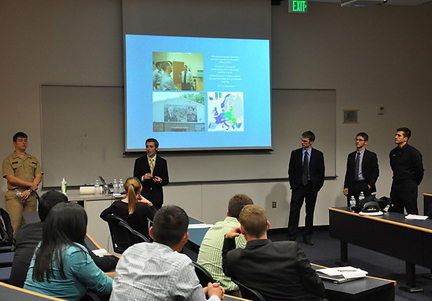ALLIES Explores Civil-Military Relations in Ukraine

|
|
This past summer, three students from the Institute’s ALLIES Program (Alliance Linking Leaders in Education and Service) teamed up with students from the US Air Force Academy, US Military Academy, and US Naval Academy to travel to Ukraine and conduct research on the future of that country’s military reforms. The trip was the fourth ALLIES Joint Research Project (JRP) that has taken Tufts students and members of the service academies to Chile and Jordan in recent years to study civil-military issues. This year’s JRP was organized through the US Naval Academy.
Prior to beginning their research in Ukraine, they met and discussed in the US with academics and experts on military issues in the former Soviet Union. In the research process, they focused on the political and economic factors, both domestic and international, that were likely to influence attempts at military reform.
The ALLIES members - Taylor Bates (A’12), Austin Field (A’11), and Aaron Greenwald (A’12) - travelled to Ukraine in July and August with four other students from the service academies and conducted interviews with local military experts, retired military officers, government officials, and defense attaches at foreign embassies.
The ALLIES students discovered that poor civil-military interaction impedes effective military reform in Ukraine. While legislation and reform efforts have put civilian authority in charge of the armed forces, few civilian officials retain meaningful oversight of the military. In addition, the military itself lacks efficient feedback channels to inform government officials in charge of funding reform efforts about necessary changes. These problems are compounded by the fact that most members of the military are of a much lower social class compared to the politicians above them, and there is little interaction between the two groups. The result, according to local military experts, is that military reform is not a priority for the government officials who are ostensibly in charge of such action.
An even larger obstacle to reform is the lack of funding for modernizing the armed forces. The economic difficulties that have affected Ukraine since its independence from the Soviet Union continue to plague the military and defense sectors. In the most recent budget only 1.7% of GDP went toward defense spending, barely half the legally required amount, resulting in a military that is severely underfunded and forced to work with insufficient and ageing equipment and infrastructure. Internal estimates provided to the ALLIES group indicate that Ukraine would need to triple its defense spending to move toward international standards for defense readiness, yet the current economic situation makes such change impossible. Rather, the budget for armed forces has continued to be cut: in 2009 the military began removing 150,000 personnel in addition to other cost-saving measures. The students found that because any serious reform would be quite expensive by Ukrainian standards, the military is unlikely to receive the funds necessary to carry out such reforms and modernize in the near future.
Domestic politics also make serious reform unlikely. Corruption runs rampant in the Ukrainian political structure, and many sources told the ALLIES group that politicians in charge of allocating scarce state resources were more concerned with placating unhappy coalition partners, debtors, and interest groups than supplying the military with the funding necessary to adequately protect the country. The students concluded that this would lead to ineffective military reforms as civilian officials use reform primarily as a method for freeing up resources rather than modernizing the armed forces and addressing security concerns.
Looking to the future, the ALLIES students noted that it is likely impossible for Ukraine to remain independent of military alliances, despite the rhetoric of its politicians. As the current government recently put a halt to plans to join the NATO alliance, members of the JRP concluded that Ukraine will most likely strengthen its military ties with Russia. Most of the experts and officials interviewed agreed with this finding, noting that popular sentiment in Ukraine is much more inclined toward a closer alliance with Russia than with NATO. For many Ukrainian officials it would be far easier to solicit Russian military assistance than to take up the expensive and time-consuming task of enacting meaningful reforms at home.
The JRP members highlighted a number of recommendations to help Ukraine carry out necessary military reforms and further the interests of the United States in the region. First, the U.S. should encourage Ukraine’s involvement in the GUAM Organization for Democracy and Economic Development, a partnership between Georgia, Ukraine, Azerbaijan, and Moldova aimed at counteracting the extension of Russia’s influence in the region. A mutual defense treaty between these nations would address Ukraine’s military concerns and prevent a shift toward closer Russian ties. Second, the U.S. government should make clear to the Ukrainian leadership that America takes seriously the decay of Ukraine’s military. Third, while Ukraine no longer aims to become part of NATO, it is still open to “partnership” with the alliance. NATO should take advantage of this by providing greater funding and expertise to help Ukraine implement military reforms.

